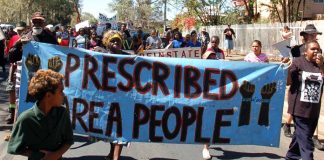WITH THE ALP’s promised review into the first year of the NT intervention due to begin in July, there are new crises cracking the facade of the policies. The roll out now affects about 7700 Centrelink recipients in 29 Territory communities. Three groups of town camps are also subject to the restrictions.
 Welfare quarantining, alcohol restrictions and other intervention measures have in some cases doubled Aboriginal populations in town camps around major urban centres like Darwin, Alice Springs, Katherine and Mt Isa. This is increasing pressure on local welfare and support groups. Police in Alice Springs have responded with “special operations” targeting minor offences such as loitering and alcohol consumption. There were over 180 arrests over a single weekend in April.
Welfare quarantining, alcohol restrictions and other intervention measures have in some cases doubled Aboriginal populations in town camps around major urban centres like Darwin, Alice Springs, Katherine and Mt Isa. This is increasing pressure on local welfare and support groups. Police in Alice Springs have responded with “special operations” targeting minor offences such as loitering and alcohol consumption. There were over 180 arrests over a single weekend in April.
Lyle Cooper, acting president of Darwin’s Bagot Aboriginal community says, “Since the intervention, the population of Bagot has risen from 500 to 1200 people, and this is placing a significant burden on utilities and causing fear among long-term residents”.
There has been a racist backlash led by members of the Country Liberal Party and local media demanding that Aboriginal people be “removed” back to their communities.
Sue Gordon, chair of the Intervention Taskforce, recently conceded that after 12 months the “one size fits all” approach to welfare quarantines needs adjustment. Taskforce operational commander Major General Chalmers now advocates a “remove and return” program for people trying to escape the intervention. The ALP has been forced to reopen 33 CDEP projects in communities where vital services had been closed after the project’s abolition.
These crises are a direct result of the intervention policies. Living conditions in remote communities are becoming less stable and this is creating further social problems. The grassroots campaign against the intervention is demanding that both federal and state ALP governments end the takeover of Aboriginal communities, stop punitive attacks on social security and civil liberties, and instead start to properly fund and develop neglected communities in consultation with traditional owners.
Some communities are resisting the roll out of the intervention. In Yuendumu the community has been able to hold off the implementation of income quarantining, beating four Centrelink deadlines for its introduction in an impressive display of community strength. The government is in the difficult position of having to compulsorily acquire the Yuendumu local stores to forcibly introduce the quarantining system, giving confidence to other NT communities to resist the roll out on the ground.
Despite the growing dissent, state ALP governments are rolling out their own legislation to wind back Aboriginal rights. On May 13 the Bligh government introduced the Aboriginal and Torres Strait Islander Land Amendment Bill 2008 that will force Queensland’s Indigenous communities onto 99 year leases and make way for the compulsory acquisition of land.
The proposed bill follows similar attempts by the Howard government to force NT Indigenous communities onto 99 year leases, arguing that communal land ownership was an obstacle to real economic development.
Despite incentives in the form of funding for much needed infrastructure and basic services, only one community on the Tiwi Islands was convinced to accept a 99 year lease, while the majority continue to firmly reject the attempted takeover.
Under the plan, traditional owners would lease the entire township of Nguiu to a statutory body that would then sublease to commercial developers. In return Nguiu residents would get $5 million in community funding, 25 new houses, a new college and oval, and money for health programs.
At both a state and federal level ALP governments have accepted the logic that land tenure reform is central to the improvement of conditions in Aboriginal communities. By forcing under-funded and neglected communities to give up control of their land in exchange for basic services such as housing, the government aims to use the threat of deprivation as leverage to formally end Aboriginal control of land.
By Lauren Mellor





